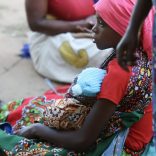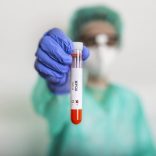UNICEF warns of fallout from education funding cuts
Mozambique registers 154,000 new cases of tuberculosis every year

Mozambique has made significant progress in the diagnosis and treatment of tuberculosis (TB), although it continues to register high rates of transmission of the disease with around 154,000 new infections per year.
The figures were made public on Sunday in Maputo by the Deputy Minister of Health, Mouzinho Saide speaking in the context of the celebrations of World Tuberculosis Day, held under the banner, “United to End Tuberculosis”.
Saide said 2016 was a year of great impact in the fight against TB in the country, characterised by an increase of about 18 percent in the notification of diagnosed cases, which resulted in the growth of the reporting rate from 239 to 278 per 100 thousand cases.
“As a result of the efforts undertaken, in 2016 we were able to diagnose, notify and initiate the treatment of 9,283 children infected with childhood tuberculosis. Twelve per cent of the total cases reported at national level were children. This number is within the standards acceptable to the World Health Organization, which recommends between 10 and 15 percent,” he said.
The deputy minister explained that the gains made are the result of a combination of efforts, including the training of more “coughing officers”, who help identify signs and symptoms of the disease in waiting rooms of the health units, as well as coordination with the various community actors, including practitioners of traditional medicine.
There is also an increase in the demand for hospitals and the simplification of the criteria for the use of the ‘Genexpert’ rapid TB test, which is the first option in all places where the device exists.
“We are aware that we need to improve collaboration with the community in order to increase the search for undiagnosed cases, but also to improve and expand the action of “coughing officers” in order to increase the rate of diagnosis and decrease the waiting time for treatment,” Saíde acknowledged.
Despite these gains, TB continues to be a threat to public health in the country, especially drug resistant cases. Last year alone, 911 of drug-resistant TB were reported.
According to Ivan Manhiça, director of the National Tuberculosis Program, the country annually uses about US$8 to 9 millions-worth of drugs to treat the approximately 2,500 drug-resistant and 73,000 drug-sensitive TB patients.
“A patient with tuberculosis sensitive to the drug component costs about US$100 and with resistant tuberculosis (under the current regime) costs about US$2,000,” he noted.












Leave a Reply
Be the First to Comment!
You must be logged in to post a comment.
You must be logged in to post a comment.